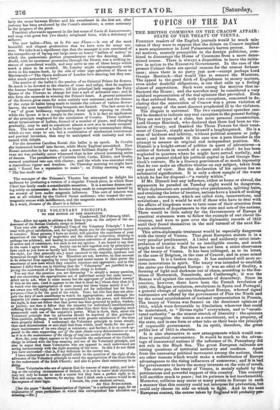THE VOLUNTARY PRINCIPLE.
TO THE EDITOR OF TUE SPECTATOR.
Camberwell, 23d February 1847. Sin—Allow me again to address a few lines to you on the subject of the en- dowment of the Roman Catholic clergy in Ireland. Your very able article " Arbitrary Uses of the Voluntary Principle," I have read with great satisfaction, and, for myself, thank you for the suggestive matter it contains. Many persons, I have no doubt, will question the soundness of your exposition of the rights of majorities and the duties of minorities, thinking it perhaps too arbitrary, and leading to conclusions subversive of absolute freedom of action and of conscience; but such is not my opinion. I am bound to say that in the main I agree with you. Society can be held together only by principles or laws such as you have so lucidly laid down. Minorities, although completely in the right, (as they generally are,) must succumb to the majority, ignorant and tyrannical though the majority be. Minorities are not, however, on that account to be debarred from opposing by every legal and moral means in their power the enactment of new laws which they conceive injurious and oppressive; and in this manner I differ from you in thinking that the " Voluntaries" are justified in op- posing the endowment of the Roman Catholic clergy in Ireland. You say that the question you are discussing " is simply a money question, and one concerning the appropriation not of individual money but state money." Allow me to ask, what is state money but the aggregate of individual money, If this be the case, (and it appears to me that it mast be,) whose duty then is it to watch over the appropriation of state money but those whose money it is? I am aware you will reply, that it is contributed not for individual but for State purposes—that is for the good of the whole. True; but this fact does not abro- gate the duty of each contributor to watch its appropriation; and although the majority (or state—represented by a government) have the power, and therefore the right, it does not follow that that power has been governed by policy, wisdom, or justice; nor does it follow that the minority (or individual) conscientiously differing from the majority, have done any other than their duty in opposing most strenuously such use of the majority's power. What is there, then, about the Voluntary principle that its advocates should be deprived of this privilege ? This question, perhaps, would be answered with greater satisfaction if the term were properly defined. I understand the Voluntary principle to mean simply, that each denomination or sect shall find from within itself funds for the pecu- niary maintenance of its own clergy or ministers; and farther, it is as much op- posed to the state supporting out of the state funds every denomination or sect as it is to the maintenance of the clergy of any one section of the community. Now, Sir, your object appears to be to reconcile the endowment of the Catholic clergy in Ireland with the true meaning and use of the Voluntary principle, and also to argue that those Voluntaries who are opposed to such endowment are acting inconsistently with the right meaning of the term. In this I do not think you have succeeded—that is, if my definition be the correct one.
1 have endeavoured to confine myself solely to the question of the right of the advocates of the Voluntary principle to resist the appropriation of the State funds to the endowment of the Irish Church; and also to prove their consistency in so doing. Those Voluntaries who are of opinion that for reasons of state policy, and look- ing at the existing circumstances of Ireland, it is well to waive their objections, may not only be honest in such a course but they have a perfect right to it. You will excuse me, however, for saying, that I think such a course would be at the expense of their logic. I remain, Sir, your obedient servant,
AN OLD SUBSCRIBER. AN OLD SUBSCRIBER.
[See the paper "Social Emancipation of Opinion," in a subsequent page, for an explanation of some particulars in which this correspondent has mistaken our ineaning.—En.]


























 Previous page
Previous page